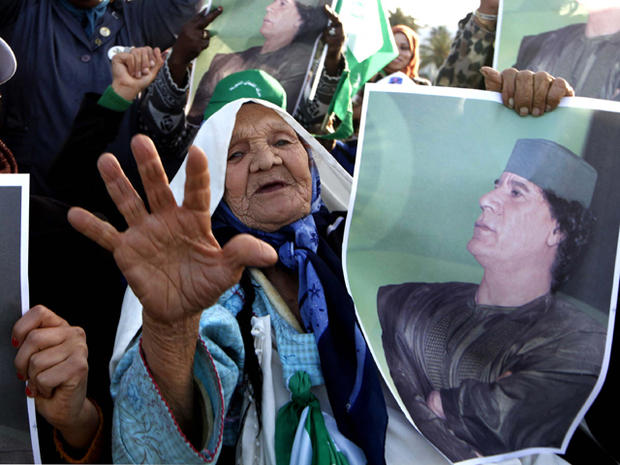Libyan dissent exists in Tripoli in whisper form
TRIPOLI, Libya - Scientists searching for dark matter, the elusive stuff that is supposed to make up the unseeable universe, should look in Libya. There is an alternative reality here, manufactured by the regime, where facts are selective or imagined and where perceptions don't necessarily follow. Yet, wormholes are appearing between the world according to Muammar Qaddafi and the universe the rest of us occupy.
Complete Coverage: Anger in the Arab World
Walking through the dutifully cheering crowds on Green Square the other day, where people were celebrating the government's premature announcement of victory, a man I hadn't seen appeared beside me and spoke quietly in perfect English. He told me to look away as we talked so he wasn't seen in conversation with a foreigner.
(Watch Phillips at left engage in a similar conversation at the 1:18 mark of his "CBS Evening News" piece from Monday)
After a few of these rallies, you start to recognize the faces of the main celebrants, the ones who repeatedly show up on Libyan state TV as images of the cheering crowds run and run. There's an expression in Libya: Qaddafi's support is 10 dinars deep, about $7 at the official exchange rate.
But public expression of dissent -- even whispered dissent -- is a new thing. It would have been unthinkable for anyone to approach a foreigner on the street before. People are becoming bolder. They're taking risks, thinking this may be the one chance they have in their lifetime. The dreaded secret police may still be all-powerful, but the thought police are losing their grip.
The reason is TV and the Internet. Satellite dishes -- officially discouraged but sprouting anyway -- bring in the signals of the Gulf-headquartered Arabic news channels, Al-Jazeera and Al-Arabiya. And when the web is up -- it wasn't Tuesday -- the wired classes are informed of events in the neighboring countries of Tunisia and Egypt. The unthinkable is becoming thinkable, or at least dream-able. And there's only so much green flag waving you can stand to watch.
Oddly though, the people who should be best informed have yet to change their playbook. The Qaddafi family, Muammar and his sons Saif and Saadi, have all appeared on TV to dismiss the insurgents as an unlikely combination of al Qaeda terrorists and misled drug crazed locals, aided by the United States, Britain and France.
Another brave man came up to me on a street in the Tripoli neighborhood that has seen the most active anti-regime demonstrations. When I asked him about the government line, he said everybody knows "it's a big lie."
"Do you think four million people are on drugs?" he asked.
Still, this uprising has reached its most dangerous point so far. The opposition has exposed itself and not just in Zawiya, Misurata, Ras Lanouf and Benghazi. It's come out on the streets of Tripoli as well, to be tear-gassed and shot at. Either it grows or it gets destroyed by the still-formidable forces of the regime. And it's calling out for help.
Mark Phillips is a CBS News foreign correspondent based in London.

